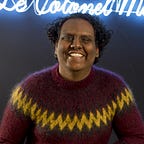“One is not born fat”: the origins of eating disorders
France. A country where women think they are never thin enough to fit the mould of the effortless Parisian girl. A country where your appearance matters as much as your CV. A country where fat people are unseen in the media and considered as lazy and dumb. In a book titled One Is Not Born Fat (“On ne naît pas grosse” in French), a woman confesses how awful it is to live in a country where you don’t fit.
Have you ever thought about what it is like to be fat in a country that celebrates slimness? There are two possible answers to this question; either you are a slim person and the idea never even crossed your mind, or you are an overweight person and this is your daily experience. Journalist Gabrielle Deydier, 330 pounds (23 and a half Stone), decided to open her mouth and tell her story for all to read. Her book was published in 2017 and made her the face of the battle against grossophobia (the fear of fat people) in France.
For each person struggling with obesity, there is an individual story. Gabrielle’s story begins in her first year of high school. More muscular than her fellow female classmates, she began wearing clothes in size 12 instead of her usual 10. Her worrying mother advised her to see a doctor and, of course, start dieting. The doctor detected an adrenal gland disease and sent her home with a hormonal treatment and diet plan, claiming that she had to lose at least 44 pounds (3 Stone).
Pills she was prescribed caused her to break out in spots and spurted a rapid growth of body hair. Worse, the craving for food due to the very strict diet made her gain even more weight over the course of one summer. Out of this, an eating disorder was born. Add to this story, a mother who glorifies her own slimness and a father who thinks his ex-wife — her parents divorced — looks like “a greasy sow” because she is a size 10. This nightmare went on for years before Gabrielle would finally graduate high school and leave home for university in a bigger city. Since then, she continued to gain weight as well as feel increasingly less confident about her self-image and her ability to achieve her career goals.
FEAR DOCTOR
Above her own personal story, throughout the book Gabrielle reveals how rude and abrasive some doctors can be with their overweight and obese patients. If it is not her gynaecologist telling her “I can’t see anything”, it is her dentist who tells her she may be too fat for the seat. Doctors also recommended her obesity surgeries hundreds of times, claiming how fast she would be able to lose weight. These kind of surgical operations are now commonplace in France, with nearly 50,000 patients per year opting to go under the knife. And if the French doctors do not consider the patient fat enough or psychologically prepared? Well, he or she can easily fly to have it done in Tunisia or Eastern Europe.
These operations can seem like a ‘last chance saloon’ for many suffering from morbid obesity. In some cases, they put so much trust in the act of surgery that they often neglect post-op procedures, the pain, mental health effects and the fact that their eating disorder cannot be cured with a scalpel. And for successful patients who shed the excess pounds? They now have to cope with their new image, not necessarily an easy task — the number of suicides occurring after an obesity surgery is at its highest point since records began.
“YOU ARE SICK, IT’S NOT YOUR FAULT”
Given the therapeutic nature of writing, Gabrielle completing her book provided a cathartic antidote to the hatred of her own self-image. Thanks to the kind words of one doctor who told her that obesity was a sickness that was not her fault, she started understanding that nobody is born fat. Obesity is always the result of a precise equation. Gabrielle’s is simple. When she went to the doctor during her teenage years, he made an erroneous diagnosis. What her doctor believed to be an adrenal gland disease was in fact, like 5 to 10% of women globally, a case of Stein-Leventhal syndrome, a sickness situated in the ovaries from which obesity is a common side-effect.
Many things can cause one to become obese, a bad diet (possibly inherited by parents), genetic predispositions, hormonal sickness, contraception pills, and of course eating disorders. But the common point among all of these illnesses is that they are illnesses. Just as one cannot help suffering from cancer or diabetes, one cannot freely make the choice of becoming obese.
After 150 pages, Gabrielle realised that she had been collateral within a complicated system. Had the world around during her teen years viewed her size 12 with a little more kindness and compassion — over contempt or mockery — she wouldn’t have begun cycling hormonal treatments or unorthodox diets so young.
Thanks to this therapy, she has realised that she was neither dumb nor lazy, but rather a sick person who received cruelty and judgement instead of the treatment and care that she rightly deserved.
“One is not born fat” is supposed to be translated in English soon but negotiations are still running. The book is currently available in French.
